|
|
|
Sort Order |
|
|
|
Items / Page
|
|
|
|
|
|
|
| Srl | Item |
| 1 |
ID:
111742


|
|
|
|
|
| Publication |
2012.
|
| Summary/Abstract |
Outside intervention in civil warfare is important for humanitarian, theoretical, and practical policy reasons-since 2006, much of the debate over the war in Iraq has turned on the danger of external intervention if the United States were to withdraw. Yet, the literature on intervention has been compartmented in ways that have made it theoretically incomplete and unsuitable as a guide to policy. We therefore integrate and expand upon the theoretical and empirical work on intervention and apply the results to the policy debate over the US presence in Iraq using a Monte Carlo simulation to build upon the dyadic results of probit analysis. We find that Iraq is, in fact, a significantly intervention-prone conflict in an empirical context; the prospect of a wider, regional war in the event that violence returns in the aftermath of US withdrawal cannot safely be ignored.
|
|
|
|
|
|
|
|
|
|
|
|
|
|
|
|
| 2 |
ID:
111741
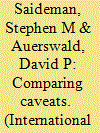

|
|
|
|
|
| Publication |
2012.
|
| Summary/Abstract |
The North Atlantic Treaty Organization is the most robust and deeply institutionalized alliance in the modern world, yet it has faced significant problems in running the International Security Assistance Force (ISAF) in Afghanistan. Specifically, the coalition effort has been plagued by caveats: restrictions on what coalition militaries can and cannot do. Caveats have diminished the alliance's overall effectiveness and created resentment within the coalition. In this article, we explain why ISAF countries have employed a variety of caveats in Afghanistan, focusing on the period from 2003 to 2009. Caveats vary predictably according to the political institutions in each contributor to ISAF. Troops from coalition governments are likely to have caveats. Troops from presidential or majoritarian parliamentary governments tend, on average, to have fewer caveats, but specific caveats depend on the background of key decision makers in those countries. To demonstrate these points, we first review key limitations facing military contingents in Afghanistan. We then compare the experiences of Canada, France, and Germany and find that our institutional model does a better job of explaining the observed behavior than do competing explanations focusing on public opinion, threat, or strategic culture. We conclude with implications for both research and North Atlantic Treaty Organization's future.
|
|
|
|
|
|
|
|
|
|
|
|
|
|
|
|
| 3 |
ID:
111746


|
|
|
|
|
| Publication |
2012.
|
| Summary/Abstract |
The possession of nuclear weapons confers many benefits on a state. The path to proliferation, however, is often violent. When a state initiates a nuclear weapons program, it signals its intent to fundamentally alter its bargaining environment. States that once had an advantage will now be disadvantaged. This change in the environment is not instantaneous, but evolves slowly over time. This gives states both opportunities and incentives to resolve underlying grievances, by force if necessary, before a nuclear weapons program is completed. Our cross-national analyses of nuclear weapons program and the onset of militarized conflict confirm this expectation. In particular, the closer a state gets to acquiring nuclear weapons, the greater the risk it will be attacked (especially over territorial issues). Once nuclear weapons are acquired, however, the risk of being attacked dramatically drops, though not below the risk of attack for non-proliferators.
|
|
|
|
|
|
|
|
|
|
|
|
|
|
|
|
| 4 |
ID:
111745


|
|
|
|
|
| Publication |
2012.
|
| Summary/Abstract |
This article explores why governments commit to human rights enforcement by joining the International Criminal Court (ICC). Compared with other international institutions, the ICC has substantial authority and autonomy. Since governments traditionally guard their sovereignty carefully, it is puzzling that the ICC was not only established, but established so rapidly. Looking beyond traditional explanations for joining international institutions, this study identifies a new causal factor: a country's dependence network, which consists of the set of other states that control resources the country values. This study captures different dimensions of what states value through trade relations, security alliances, and shared memberships in international organizations. Using event history analysis on monthly data from 1998 to 2004, we find that dependence networks strongly affect whether and when a state signs and ratifies the ICC. Some types of ratification costs also influence state commitment, but many conventional explanations of state commitment receive little empirical support.
|
|
|
|
|
|
|
|
|
|
|
|
|
|
|
|
| 5 |
ID:
111739


|
|
|
|
|
| Publication |
2012.
|
| Summary/Abstract |
This paper compares the explanatory power of two models of UN intervention behavior: (i) an "organizational mission model" built around the proposition that variations in the amount of resources that the UN devotes to different conflicts primarily reflect the degree to which a conflict poses a challenge to the UN's organizational mandate of promoting international peace and stability and (ii) a "parochial interest model" that revolves around the purely private interests of the five veto-holding members of the UN Security Council (the so-called P-5), i.e., interests that are either unrelated to or at odds with the UN's organizational mandate. Examining data on UN conflict management efforts in more than 270 international crises between 1945 and 2002, we find that measures of the severity and escalatory potential of a conflict are significantly better predictors of the extent of UN involvement in international crises than variables that measure P-5 interests that do not align with the UN's organizational mission of acting as a global peacemaker. This suggests that the UN adheres more closely to the humanitarian and security mission laid out in its Charter than critics of the organization often suggest.
|
|
|
|
|
|
|
|
|
|
|
|
|
|
|
|
| 6 |
ID:
111749
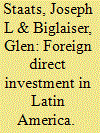

|
|
|
|
|
| Publication |
2012.
|
| Summary/Abstract |
An extensive literature has emerged recently that investigates the determinants of foreign direct investment (FDI) in developing regions of the world, including Latin America. Much of this work has focused on whether authoritarian or democratic rule is better for attracting FDI. Curiously, little attention has been devoted to unpacking regime type to see whether specific political institutional variables related to judicial strength and adherence to the rule of law are important FDI determinants. Based on panel data analysis and our own survey of US corporations, we find that judicial strength and rule of law elements are important determinants of FDI in Latin America.
|
|
|
|
|
|
|
|
|
|
|
|
|
|
|
|
| 7 |
ID:
111744
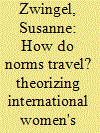

|
|
|
|
|
| Publication |
2012.
|
| Summary/Abstract |
If women's rights norms have become internationally acknowledged, is it reasonable to assume that the status of women worldwide has improved because of international norms? It is argued here that the assumption of a global-to-local flow of norms inherent in most of the global norm diffusion literature is simplistic. To provide a more adequate theoretical framework, the paper juxtaposes the debate on the impact of international regimes and the power of global norms with an interdisciplinary mix of transnational approaches that identify multidirectional processes of appropriation and contestation of global norms. Departing from the Convention on the Elimination of All Forms of Discrimination Against Women (CEDAW) as the most authoritative and steady piece of the international women's rights discourse, the transnational perspective developed here proposes three main constellations of traveling global norms: global discourse translation, impact translation, and distorted translation.
|
|
|
|
|
|
|
|
|
|
|
|
|
|
|
|
| 8 |
ID:
111747
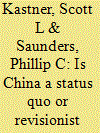

|
|
|
|
|
| Publication |
2012.
|
| Summary/Abstract |
China's rising power and increased global activism have attracted increasing attention, with particular focus on whether a stronger China is likely to be a revisionist or status quo state. Power transition theory highlights the potential for a dissatisfied rising power to challenge the existing international order, but it is difficult to evaluate whether a rising power is dissatisfied. Where Chinese leaders choose to travel can offer insights into whether China's behavior is more consistent with that of a revisionist or status quo state and into China's broader diplomatic priorities. We present a series of expectations concerning how the travel patterns of a challenger state are likely to differ from the travel patterns of a status quo state. Using a newly compiled data set, we then analyze the correlates of travel abroad by top Chinese leaders from 1998 to 2008. Our results are more consistent with a status quo conceptualization of China, though there are some important exceptions such as willingness to travel to rogue states. We also use travel data to test other hypotheses about Chinese foreign policy behavior.
|
|
|
|
|
|
|
|
|
|
|
|
|
|
|
|
| 9 |
ID:
111748
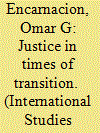

|
|
|
|
|
| Publication |
2012.
|
| Summary/Abstract |
A key contention of the transitional justice movement is that the more comprehensive and vigorous the effort to bring justice to a departed authoritarian regime for its political crimes, the better the democratization results. This essay challenges this common assumption with empirical evidence from the Iberian Peninsula, where the global wave of democratization of the late twentieth century was born. In Portugal, political trials and bureaucratic purges intended to cleanse the state and society of the authoritarian past nearly derailed the transition to democracy by descending into a veritable political witch-hunt. In Spain, by contrast, forgetting and moving on prevailed, an approach that facilitated the country's emergence as the paradigmatic example of a successful democratic transition. Among the many lessons suggested by these counter-intuitive examples is that there is no pre-ordained outcome to any attempt at transitional justice. This is so because the principal factors driving the impulse toward justice against an old regime tend to be political in nature rather than ethical or legal. In Portugal, the rise of transitional justice mirrored the radicalism of the left-wing revolution that launched the transition to democracy. In Spain, the absence of transitional justice reflected the pragmatism imposed by the self-reinvention of the authoritarian regime and the political trauma inflected by the Spanish Civil War.
|
|
|
|
|
|
|
|
|
|
|
|
|
|
|
|
| 10 |
ID:
111743
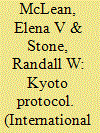

|
|
|
|
|
| Publication |
2012.
|
| Summary/Abstract |
The politics of ratifying the Kyoto Protocol may suggest a two-level game; yet, our quantitative analysis shows that ratification constraints did not affect bargaining over the Protocol, nor did bargaining outcomes affect ratification. The politics of the Kyoto Protocol are best understood as an example of the 'Europeanization' of international politics: European countries subordinate their domestic politics to international cooperation, and the European Union emerges as a key agenda setter. We find that European countries ratified the Protocol in lock step and offered selective incentives-such as EU accession-to most of the participants. Case studies of Russia and Poland confirm our interpretation of the empirical findings.
|
|
|
|
|
|
|
|
|
|
|
|
|
|
|
|
| 11 |
ID:
111738


|
|
|
|
|
| Publication |
2012.
|
| Summary/Abstract |
In this paper, we investigate how international law shapes leaders' decisions regarding the use of force in the context of territorial disputes. We argue that if the legal principles relevant to the dispute are capable of suggesting a focal point, international law will have a powerful role to play in informing leader behavior. Specifically, if a focal point exists, the state that it favors will avoid using force and prefer negotiations when considering an initial challenge to the status quo. However, we expect focal points to have the opposite effect once states are involved in a militarized dispute. Under these circumstances, the state with a legal advantage will be more likely to escalate the level of military force. Using a series of statistical tests, we find strong support for our theoretical argument.
|
|
|
|
|
|
|
|
|
|
|
|
|
|
|
|
| 12 |
ID:
111737


|
|
|
|
|
| Publication |
2012.
|
| Summary/Abstract |
Do the "shaming" activities of HROs (human rights international non-governmental organizations) have a direct influence on state behavior? We argue, consistent with existing scholarship, that states targeted or "shamed" by these organizations do improve their human rights practices. However, mere shaming is not enough. Improvements in human rights practices result from the interaction of shaming by HROs with (i) a domestic presence of HROs within the targeted state and/or (ii) pressure by third-party states, individuals, and organizations. Using a new data set of the shaming events of more than 400 HROs toward governments, we test these propositions quantitatively and find widespread support for the arguments. This research provides the first global quantitative evidence of the conditional importance of HRO shaming in transnational advocacy efforts.
|
|
|
|
|
|
|
|
|
|
|
|
|
|
|
|
| 13 |
ID:
111740


|
|
|
|
|
| Publication |
2012.
|
| Summary/Abstract |
Can states usher in more peaceful relations with their neighbors by signing agreements that delineate their territorial boundaries? Theory suggests such a possibility, but the empirical evidence to date remains limited by research design and variable measurement decisions. After assembling a new data set on international boundary agreements, the current study conducts the first thorough test of this question during the period 1816-2001. The findings indicate that once neighboring states settle their borders, they are less likely to go to war or experience militarized interstate disputes with one another. These pacific effects persist across numerous time periods even after controlling for joint democracy, a characteristic that both theory and this analysis show to be positively related to settled borders. Through these findings, the study suggests that signing international boundary agreements can bring neighbors a more peaceful relationship with one another, regardless of the characteristics of their respective governmental regimes.
|
|
|
|
|
|
|
|
|
|
|
|
|
|
|
|
|
|
|
|
|